Peaty uncoupler vs. Ozempic who wins ? New study.
-
Very interesting study, that compares a bunch of weight loss drugs in terms in diabetic mice.
Why this is so relevant is because they included a relatively new uncoupler, called BAM15, which is basically a safe version of DNP.
BAM15 has been used in other studies with remarkable results.
So now they compared it against calorie restriction (60%) and Ozempic a.k.a. semaglutide.Findings:
-
BAM15 (highest dose) decreased body weight by 30% , just as much as restricting calories by 60%. BAM didn't cause a reduction in food intake.
Let that sink in. You don't need to starve yourselves and get ozempic face.
Ozempic only caused a 12% body weight reduction.
Body weight:
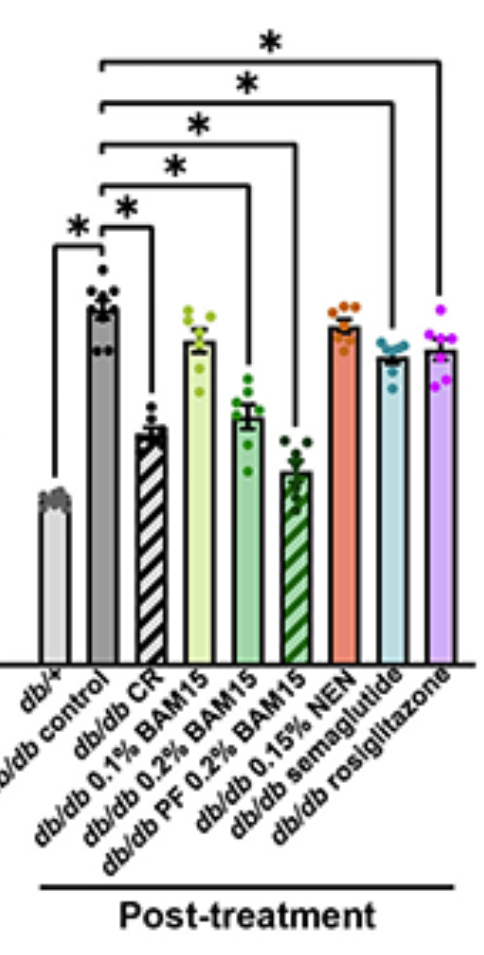
Mice fed BAM15 had the highest percentage of muscle of all treatment groups.
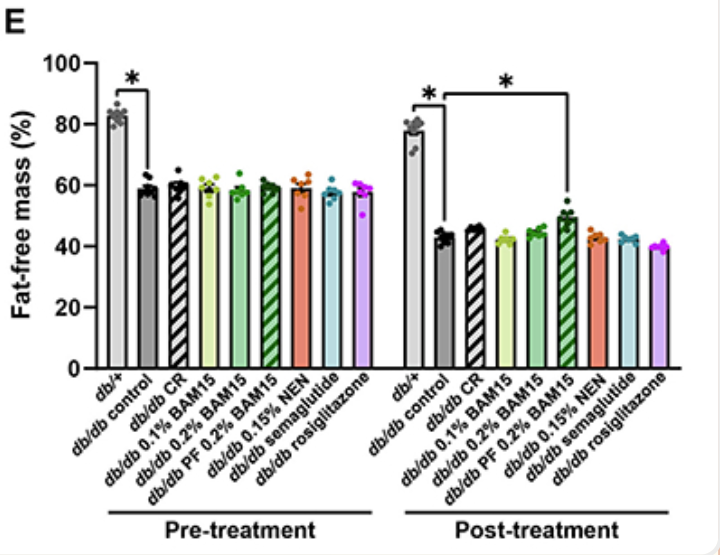
-
Glucose tolerance:
Again: highest BAM15 dose was at least equally as effective as semaglutide in restoring glucose tolerance. Even though semaglutide is marketed as a diabetes treatment. -
When it comes to liver health Bam was more effective than semaglutide . It lowered liver triglycerides way more then semaglutide and it also lowered overall liver weight more.
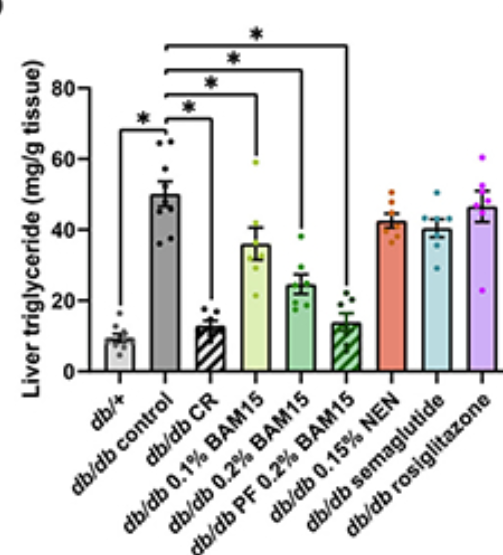
-
BAM15 increases oxygen uptake by about 20% weight increasing movement, indicating Uncoupling.
-
The calorie restriction group actually didn't loose much more muscle than the other treatment groups, which is surprising.
-
They also looked at niclosamide (NEN), which was pretty useless. Niclosamide doesn't seem to work well in diabetic individuals, but otherwise it's a great drug. Talked about it here: https://bioenergetic.forum/topic/3563/niclosamide-reduces-serotonin-and-glutamate?_=1745666192303
STUDY:
https://pmc.ncbi.nlm.nih.gov/articles/PMC10908303/#S13 -
-
BAM15 is only available at this website AFAIK
https://swisschems.is/product/bam-15-15mg-capsule-60-capsules/Unfortunately they dont ship to Germany, so I can't try it. But if someone from the US would be willing to split theirs with me, I'd be very happy:)
-
@Mauritio It's available at much cheaper prices and much higher quantities via reputable peptide vendors.
Seems interesting. Would love to try some if I see some lab tested product available.
However the doses were UNREASOABLE AND DANGEROUS
The diet was composed of 0.1% and 0.2% BAM 15. For example; The average food daily intake of the 0.1% group was roughly 10 grams a day on average
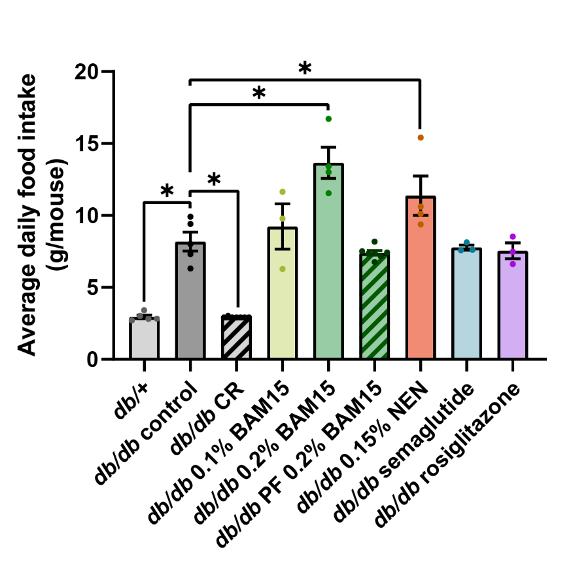
Therefore, they were intaking 0.01g of BAM 15 a day.
The body weight of this group before the treatment was around 30 grams and after the treatment it was around 40 grams. We do not have access to average bodyweight - so we do not have the same units as average food intake.
Let’s assume their average body weight was half way between the starting and end bodyweight; 35 grams.
35 grams is 0.035kg
This means they were consuming 2.857 grams of Bam 15 per kg of bodyweight. (0.01/0.035)
In milligrams this is 2857 milligrams per kg of body weighh
The HED dose would be only 228.57mg / kg a day.
For a 80kg man, this is 18,285 milligrams a day or 18.25grams a day
Luckily the semaglutide dosage was much more simple to calculate. It was a dose of 0.3mg per kg twice per week. The HED is 0.024mg per kg twice per week.
This means that for a 80kg man this is 1.92mg of semaglutide twice per week. This is nearly double the maximum dose approved by the FDA which is 2.25mg a week.
So you are comparing 3.84mg of Ozempic a week to 18 grams of BAM 15 a day lol. Not a fair comparison but it’s the fault of the authors
-
@alfredoolivas My main concern is that BAM 15 has a potentially toxic structure:

It contains 2 fluoride atoms, and this often causes issues with drugs. @haidut does not reccomend BAM 15 for these reasons.
Toxicity was not seen in animal studies... but they may be consuming much lower doses spread out throughout the day compared to doses seen in supplements.
Also lets stop with the dogmatic "Ozempic bad" opinion

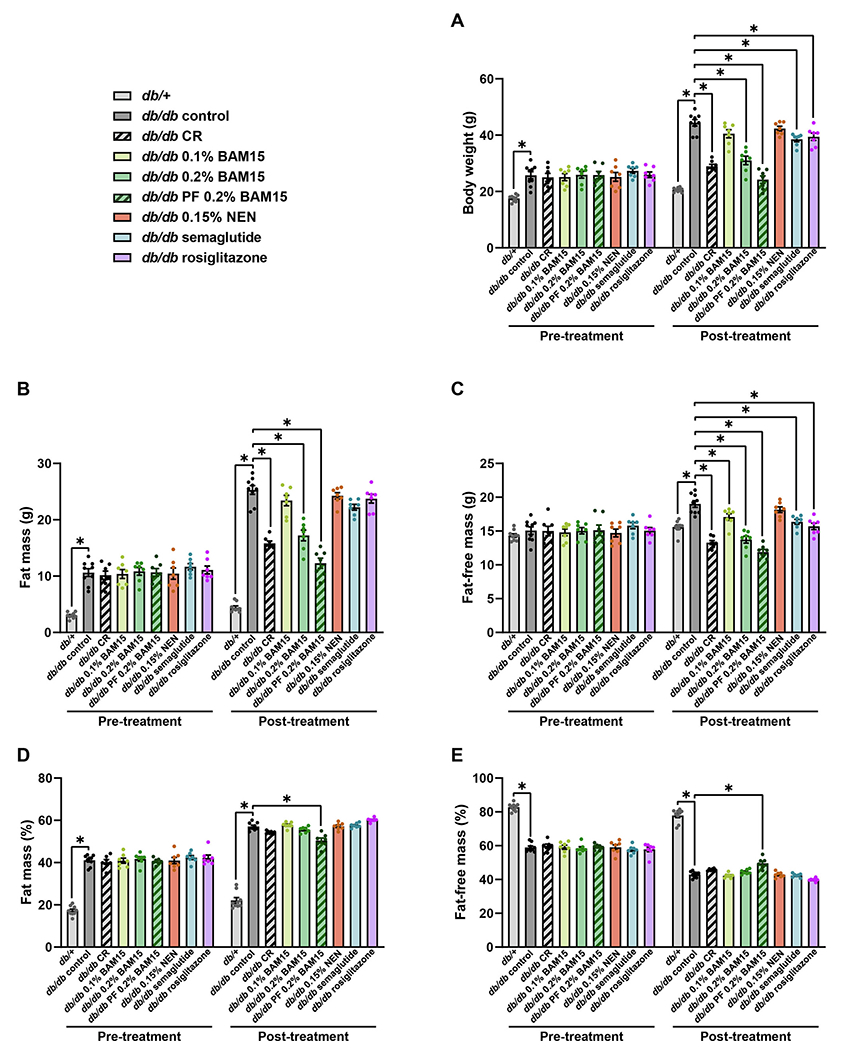
The semaglutide had similar / slightly higher fat free mass % than the BAM 15 groups

-
10 grams of BAM 15 costs 300 dollars from one of the main chinese peptide suppliers at the moment (Sigma Audley)
-
This post is deleted! -
@alfredoolivas said in Peaty uncoupler vs. Ozempic who wins ? New study.:
It's available at much cheaper prices and much higher quantities via reputable peptide vendors.
Please link I haven't found anything so far.
@alfredoolivas said in Peaty uncoupler vs. Ozempic who wins ? New study.:
However the doses were UNREASOABLE AND DANGEROUS
The dosages are very high. But that proves their safety. I you critique the potential side effects based on it's structure, you should acknowledge this study as proof of safety, because of the high dosage.
I agree, fluoride atoms could be a concern, but BAM15 has been found safe in every single study they did yet.
Of course it's still relatively early, so this obviously doesn't pass Ray's " 40 years test" .
-
@alfredoolivas said in Peaty uncoupler vs. Ozempic who wins ? New study.:
The semaglutide had similar / slightly higher fat free mass % than the BAM 15 groups
Yeah that's surprising both semaglutide and calorie restriction groups lost a lot less muscle than I expected.
-
This gentlemen has used relatively high doses of BAM15 with success although I think he also took other substances .
-
BAM down regulated SCD1 by almost 900-fold ! SCD1 concerts saturated fats into unsaturated fats and is implicated in many chronic diseases.
"...severe downregulation of sterol regulatory element‐binding transcription factor 1 (Srebf1 ; 490‐fold downregulated), carbohydrate‐responsive element‐binding protein (Mlxlpl ; 99‐fold downregulated), fatty acid synthase (Fasn ; 89‐fold downregulated), stearoyl‐CoA desaturase (Scd1 ; 898‐fold downregulated), adipose triglyceride lipase (Pnpla2 ; undetected in BAM15), and peroxisome proliferator‐activated receptor gamma (Pparg ; undetected in BAM15)”
-
Could be worse.
"In this study, the aged mice increased their muscle mass by an average of 8 percent, their strength by 40 percent, while they lost more than 20 percent of their fat.”
https://www.sciencedaily.com/releases/2022/04/220407101053.htmBAM15 increases interesting enzymes for mitochondrial functioning.
ATP Synthase for example. Which leads to more ATP beeing produced.
Citrate synthase was increased about 3-fold.
Wikipedia:
“Citrate synthase is commonly used as a quantitative enzyme marker for the presence of intact mitochondria. Maximal activity of citrate synthase indicates the mitochondrial content of skeletal muscle.[6] The maximal activity can be increased by endurance training or high-intensity interval training,[6] but maximal activity is further increased with high-intensity interval training.[7]”
→ exercise mimetic?Therefore muscle mitochondria content was more than doubled in BAM15 treated mice!
The amount of fast twitch fibers doubled!
Could be helpful for weightlifters, sprinters, etc.
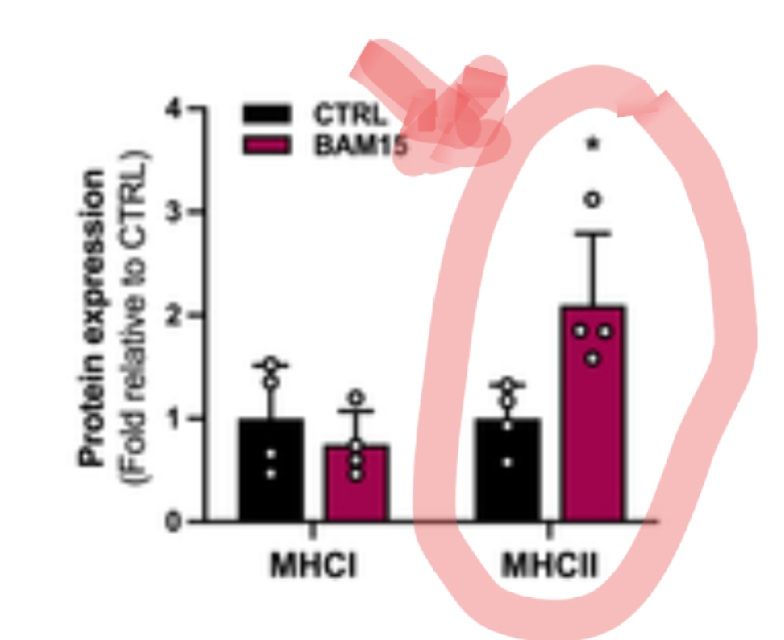
"We observed a significant increase in the fast-twitch muscle myosin heavy chain type 2 (MyHCII) but not the slow-twitch type I (MyHCI) protein expression with BAM15 compared with CTRL (Figure 2F). "Big increase in PINK1 . Important for parkinsons prevention
https://onlinelibrary.wiley.com/doi/10.1002/jcsm.12982 -
BAM15 for cancer
“In vivo investigations revealed that BAM15 effectively suppressed AML progression and prolonged the survival time of mice.”
https://www.sciencedirect.com/science/article/abs/pii/S0006295222000429
BAM for breast cancer:
"Collectively, these data indicate that mitochondrial uncoupling may be an effective strategy to limit proliferation of aggressive forms of breast cancer. "breast cancer:
https://cancerandmetabolism.biomedcentral.com/articles/10.1186/s40170-021-00274-5
-
The question wrt BAM15's 11.1% fluorine content isn't "has the compound been found safe" but does the fluorine ever dissociate in-vivo from the BAM15 molecule. If it does that's a no-no already at 10mg daily and even if "found safe". I reckon since the fluorine is incorporated in BAM15'S aromatic ring it probably is very resistant and unlikely to dissociate.
So what are the commonly applied and reported human doses of BAM15?
@Mauritio said in Peaty uncoupler vs. Ozempic who wins ? New study.:
Pparg ; undetected in BAM15
Meaning totally enabled fatty acid oxidation and lipolysis and inhibited lipogenesis by PPARg.
Does DNP exhibit a similar focus on fat burning? What's the comparative advantage to and issue with DNP as long as its dose is safely kept reasonable? -
Ah, the BAM15 is more selective than DNP and therefore safer with regard to off-target side effects:
- "Recently, we reported the identification of a novel mitochondrial uncoupler, BAM15 (5), which selectively depolarizes the inner mitochondrial membrane but not the plasma membrane.68"
- "[...] the toxicity issues associated with DNP are due to a narrow therapeutic window, which may result from unwanted depolarization of non-mitochondrial membranes such as the plasma membrane.53–56"
https://pmc.ncbi.nlm.nih.gov/articles/PMC8224984/
That's a comparative merit.
-
@Mauritio said in Peaty uncoupler vs. Ozempic who wins ? New study.:
The dosages are very high. But that proves their safety. I you critique the potential side effects based on it's structure, you should acknowledge this study as proof of safety, because of the high dosage.
@Mauritio How do you know a 0.1% and a 0.2% BAM 15 diet was safe for mice?
They only checked metabolic markers such as glucose & insulin, cholesterol, triglycerides, fat mass and muscle mass.
You cannot assess toxicities from these markers. Did they check hepactic enzymes, kidney function & did they do an autopsy? These are examples of tests they can do to check the toxicity of a drug, amongst many others.
So you cannot say it was safe from this study alone.
Via your defintion of toxicity. DNP is also safe. DNP given at mice at a dose of 89mg per kg (HED 7.12mg/kg, 569.6mg a day for a 80kg man), lowered triglycerides, lowered liver weight, lowered ALT... so it's not toxic according to your criteria, when in reality it is.
-
He is cutting calories and doing low carb
"I will say that during this I am also dieting very hard, high protein a decent amount of fats, and very low carb. I am also doing about an hour or so of cardio per day. As I mentioned above this is going to be a very intense cut so I do not recommend doing this. Not much else to report on but so far so good."
-
@CrumblingCookie I think those two things come down to the same conclusion.
Because if the fluoride atoms disassociated , should not that show up relatively quickly via systemic side effects, as in liver and kidney damage ? If not, how else do you suppose the damage would show up.In these 2 studies they looked at liver and kidney markers and found no significant difference.
-
@Mauritio said:
I think those two things come down to the same conclusion.
Because if the fluoride atoms disassociated , should not that show up relatively quickly via systemic side effects, as in liver and kidney damage ?Not necessarily as I think of fluorine/fluoride harboring quite some insidious effects on endrocrine and exocrine glands. If there was huge fluorine unloading we could expect kidney damage. E.g. if all 22mg fluorine of 200mg BAM15 dissociated.
But if it's only 5% or 10% dissociation and therefore 1.1 or 2.2mg fluorine/fluoride per day it won't be obvious but very obfuscated in a range of unspecificity. Would then require larger daily amounts of iodide and support of renal excretion to counteract.
For comparison, amiodarone also has its two halogens (iodine, 37% w/w) attached to its aromatic ring so just as with BAM15 we would expect little dissocation. It's been shown however to yield c. 10% dissociation of iodine and any dose above the very-low-dose 100mg/d is therefore an established possible cause for blood--testis barrier disruption and inflammatory degradation of the interstitial testicular tissue in humans.
Well if anyone's worried about F in BAM15 then 2-3mg of daily KI wouldn't be the worst to stack with it or in general. -
If anybody from Europe is interested in a group buy of BAM15 from sigma audley, hit me up.
We're gonna buy 10g for 300$ and divide through 3 people.
(1 spot left)
-
@Mauritio how do you get an account on sigma Aldrich? Thanks

